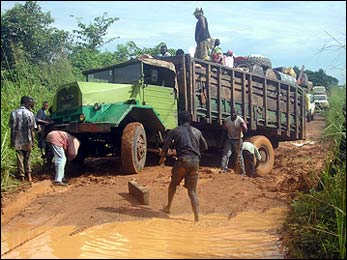UN refugee agency begins repatriation of Congolese refugees
UN refugee agency begins repatriation of Congolese refugees

MOLANGUE, Central African Republic, Oct. 21 (UNHCR) - For years, they had been waiting for this day. At dawn, 101 Congolese refugees gathered outside the camp of Molangue, 120 km south of the Central African Republic (CAR) capital, Bangui. Other refugees in the camp, home for years to some 2,900 Congolese, came to say good-bye to this first group of people leaving Molangue to repatriate to the Democratic Republic of the Congo (DRC) with UNHCR assistance. There were tears but also eager anticipation, as the group departed on its arduous journey home.
On the first leg of their trip, the refugees boarded trucks at Molangue that took them up to the banks of the Ubangui River, the vast expanse of brownish water that marks the border between CAR and DRC. Following a tripartite agreement between the two countries and UNHCR signed in August of this year, the CAR had agreed to open this border for the return of Congolese refugees. However, there are no bridges over the Ubangui River in that region. The refugees were split in smaller groups and taken across the muddy waters onboard UNHCR's motor boat, which has a limited capacity of only 15 people per crossing.
There were tears of joy and scenes of jubilation as the group set foot on DRC land. Waiting to welcome them at the Batanga transit centre were delegations from CAR, DRC and UNHCR. "This is a great moment for all of us," the DRC's Interior Minister Teophile Mbemba said. "The war is over now, and the country is ready to welcome its children back here in the province of Equateur." The ceremony was also attended by the UNHCR representatives from both CAR and DRC, delegates from the U.S. and U.K. embassies, as well as partner organisations, and, of course, the local population.
The refugees then started on the final part of their journey to Libenge and its surrounding villages. Some could hardly believe the moment they had been hoping for had finally arrived.
"All my life," an elderly man said, "I have lived here, just outside Libenge. Five years ago, I had to leave, when the rebels attacked the town. Sometimes in the camp in Central Africa, I really thought I would never see my home again."
An estimated 12,000 Congolese took refuge in neighbouring CAR during a rebellion against the government of DRC president Laurent Kabila in the late 1990s. Many want to return now, but the situation in some parts of DRC remains volatile. For the time being, UNHCR's voluntary repatriation programme extends only to the north-western province of Equateur, which is considered safe. During this first phase, UNHCR plans to repatriate 2,247 Congolese from CAR before the end of the year, at the rate of about 100 refugees per trip. Convoys are scheduled to leave thrice weekly, going to Libenge and surrounding villages at first, then to Gemena farther east from the border, and finally to the more remote areas of Gbadolite and Mbandaka.
Despite the relatively small numbers involved, this operation presents considerable logistical challenges. It is taking place in some of the most difficult terrain in the world, where roads are virtually non-existent, made impassable by torrential downpours during the rainy season, and it can take up to ten hours to travel a 100-km stretch of road. UNHCR has organised several modes of transport for the refugees - including boats to cross the Ubangui River, trucks to get through thick forests, and planes for areas where precarious airstrips exist but there is no other means of access.
The scarcity of both local and international NGOs in Equateur province also poses serious problems for the implementation of UNHCR's assistance programme to the returnees. Other UN agencies - WFP, FAO and UNICEF - help with food provision, agricultural development and children's health and education. UNHCR hands out blankets, jerry cans, and other items.

Before the movements, the refugee agency had to establish its presence and set up offices in the midst of an equatorial forest where there is little or no infrastructure. Undaunted by the conditions, staff on the ground worked with local airline companies to bring generators, telecommunications equipment and even vehicles to Libenge and Zongo, just across the border from Bangui. In Zongo, the arrival of UNHCR has had a very immediate impact: the local FM radio station, which had not been functioning due to lack of electricity, started airing its programmes again after the UNHCR generator brought power back to the city.
"It is very clear that UNHCR's presence has brought new life to the area, and hope to people who had been waiting impatiently to receive their brothers and sisters from CAR," said David Kapya, UNHCR's representative in DRC.
The Representative also added that as of January 2005, UNHCR will start facilitating the repatriation of DRC refugees living in the Republic of Congo. Hundreds of thousands of Congolese fled DRC to take refuge in other African nations to escape several waves of rebellions that ravaged the country in their attempts to topple the Kabila government for five years in the late 1990s.







